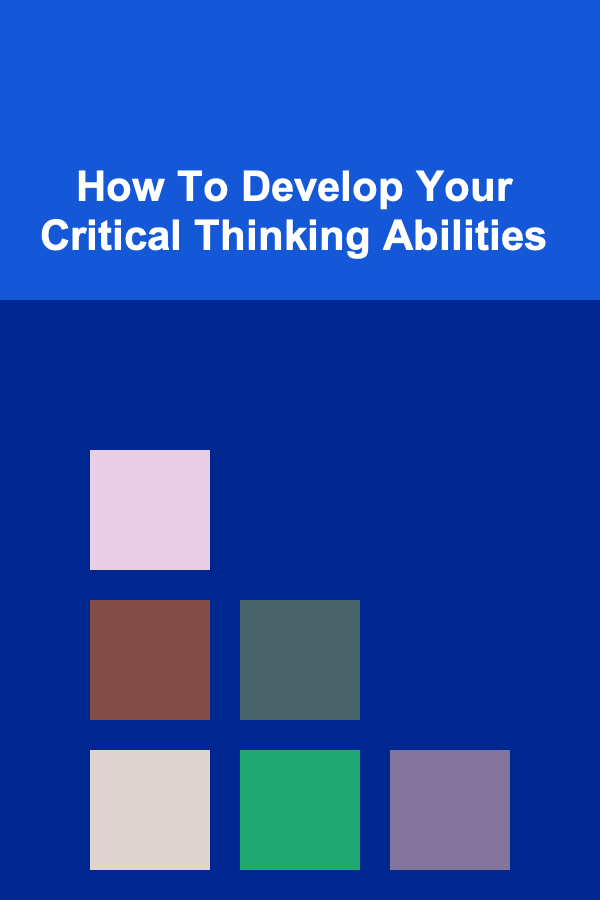
How To Develop Your Critical Thinking Abilities
ebook include PDF & Audio bundle (Micro Guide)
$12.99$11.99
Limited Time Offer! Order within the next:

Critical thinking is a crucial skill that allows individuals to analyze, evaluate, and synthesize information effectively. It involves being able to think clearly and rationally, understanding the logical connection between ideas, and making decisions based on evidence rather than emotions or assumptions. In today's fast-paced world, where information is abundant but often misleading, developing critical thinking abilities is more important than ever. Whether you're in school, the workplace, or dealing with everyday problems, honing your critical thinking can make you a more effective decision-maker, problem solver, and communicator.
What Is Critical Thinking?
Critical thinking is defined as the ability to think clearly and rationally, understanding the logical connection between ideas. It requires being open-minded and reflective, questioning assumptions, and evaluating the validity of information. Critical thinking is not merely about thinking harder but about thinking better. It's about questioning the status quo, examining the evidence, considering alternative perspectives, and drawing well-founded conclusions.
At its core, critical thinking involves:
- Analysis: Breaking down complex information into smaller components.
- Evaluation: Assessing the credibility and relevance of information.
- Inference: Drawing logical conclusions based on the evidence.
- Interpretation: Understanding and explaining the meaning of information.
- Problem-solving: Finding solutions to complex problems using logical reasoning.
These skills are not innate but can be developed through practice and reflection.
Why Critical Thinking Matters
The value of critical thinking cannot be overstated. It is fundamental to making sound decisions in any aspect of life, from personal relationships to career decisions. Here are a few reasons why critical thinking is essential:
1. Improves Decision-Making
Critical thinking helps individuals make decisions based on facts, logic, and evidence rather than emotions or biases. Whether you are deciding what to study, which career path to take, or how to handle a challenging situation, critical thinking allows you to assess the pros and cons and consider all possible outcomes before making a choice.
2. Promotes Independent Thinking
Critical thinkers do not simply accept information at face value. Instead, they question assumptions, consider multiple viewpoints, and seek out reliable sources of information. This independence leads to a more informed and reasoned approach to understanding the world.
3. Enhances Problem-Solving Skills
Life is full of challenges, and being able to solve problems effectively is a key skill in both personal and professional contexts. Critical thinking helps break down complex problems into manageable parts and analyze them systematically to find the best solution.
4. Strengthens Communication Skills
When you think critically, you can express your ideas more clearly and persuasively. This makes you a better communicator in debates, discussions, and presentations. Critical thinking helps you organize your thoughts logically and explain them in a coherent manner, which is vital in any communication.
5. Boosts Creativity
Critical thinking is often associated with logical analysis, but it also plays a role in creativity. By questioning assumptions and considering alternative solutions, critical thinkers can think "outside the box" and come up with innovative ideas and approaches.
Key Traits of a Critical Thinker
To become a critical thinker, you need to develop certain habits and traits. Here are some of the key characteristics of effective critical thinkers:
1. Curiosity
Critical thinkers are naturally curious. They ask questions and seek to understand the "why" behind things. They don't just accept things as they are but are driven by a desire to explore, learn, and discover new information. Curiosity leads to deeper inquiry and fosters a broader perspective.
2. Open-Mindedness
Open-mindedness is essential for critical thinking. Being open to new ideas, perspectives, and ways of thinking allows you to consider a wider range of information and avoid becoming trapped in your own biases. An open-minded individual is willing to revise their beliefs when presented with new, compelling evidence.
3. Objectivity
Critical thinking requires objectivity---an ability to separate emotions and personal biases from the analysis of facts. Objectivity ensures that decisions are based on evidence rather than personal preferences or assumptions.
4. Analytical Thinking
Critical thinkers possess strong analytical skills. They can deconstruct complex ideas and issues into smaller, more manageable parts, allowing them to understand the underlying principles. Analytical thinkers can identify patterns, connections, and inconsistencies in information.
5. Ability to Evaluate Evidence
Being able to assess the quality and relevance of evidence is a fundamental aspect of critical thinking. A critical thinker does not take information at face value; instead, they evaluate the credibility of sources, the validity of claims, and the logical consistency of arguments.
6. Reflective Thinking
Critical thinkers regularly reflect on their own thoughts and reasoning processes. They question their own assumptions and biases, ensuring that their conclusions are based on rational, objective thinking rather than unexamined beliefs or past experiences.
Strategies to Develop Critical Thinking Abilities
While critical thinking is an essential skill, it does not develop overnight. It requires intentional effort and practice. Here are some effective strategies to help you develop your critical thinking abilities:
1. Ask Questions
The first step in developing critical thinking is to become a curious questioner. Ask questions about everything you encounter---whether it's a statement, an idea, or a situation. Some good questions to ask include:
- What is the evidence for this?
- What assumptions are being made?
- What is the source of this information?
- Are there alternative viewpoints to consider?
- What are the implications of this idea or decision?
Asking questions helps you dig deeper into the subject matter and encourages a more thorough examination of the information at hand.
2. Challenge Assumptions
Many people tend to accept things as they are without questioning their validity. Critical thinking requires you to question assumptions, both your own and those made by others. Are the assumptions behind a statement or argument valid? What would happen if those assumptions were incorrect?
By challenging assumptions, you force yourself to think more deeply and critically about a subject. This can lead to more accurate conclusions and better decision-making.
3. Consider Alternative Perspectives
One of the key aspects of critical thinking is the ability to view an issue from multiple perspectives. Rather than settling on the first conclusion that comes to mind, take the time to explore different viewpoints and consider how they might affect your understanding of the issue.
Consider counterarguments, and ask yourself: What are the strengths and weaknesses of these other perspectives? What evidence supports them, and how do they compare to your own viewpoint?
4. Evaluate Evidence and Sources
Critical thinkers do not rely on unverified information or questionable sources. They take the time to evaluate the evidence supporting a claim or argument. Ask questions like:
- Who is providing this information?
- What is their motivation?
- Is the evidence reliable and credible?
- Are there any potential biases that could affect the information?
Evaluating sources and evidence is essential for making informed decisions and avoiding misinformation.
5. Practice Reflective Thinking
Reflection is a critical component of critical thinking. Take time to think about your thinking. Ask yourself:
- What biases or assumptions might be influencing my conclusions?
- Am I considering all relevant evidence?
- Have I thought about the implications of my decisions?
By reflecting on your own thought processes, you can identify potential flaws in your reasoning and work to correct them.
6. Engage in Discussions and Debates
One of the best ways to improve your critical thinking skills is to engage in discussions and debates with others. These conversations force you to defend your ideas and consider opposing viewpoints, which can challenge your assumptions and improve your reasoning abilities.
When engaging in debates, try to stay calm and respectful, even if you disagree. Focus on the facts and logic rather than emotions. This will help you develop a more balanced and reasoned approach to decision-making.
7. Read Widely and Diversely
Reading widely and from different sources exposes you to a variety of ideas and viewpoints. This is essential for developing critical thinking skills because it encourages you to consider a range of perspectives and challenge your own beliefs.
Read books, articles, and studies that cover diverse topics, including those outside of your comfort zone. The more knowledge you accumulate, the better equipped you'll be to think critically and make informed decisions.
8. Practice Problem-Solving
Critical thinking is closely linked to problem-solving. To develop your critical thinking skills, regularly engage in activities that require you to solve problems, such as puzzles, strategy games, or complex work tasks. These activities help you practice analyzing problems, evaluating possible solutions, and thinking logically.
Overcoming Barriers to Critical Thinking
Developing critical thinking skills is not always easy. Several barriers can hinder your ability to think critically, including cognitive biases, emotional influences, and social pressures. Recognizing and overcoming these barriers is an important part of becoming a better critical thinker.
1. Confirmation Bias
Confirmation bias is the tendency to favor information that confirms your existing beliefs or opinions. This bias can lead to faulty reasoning and poor decision-making. To overcome confirmation bias, actively seek out information that challenges your beliefs and consider alternative viewpoints.
2. Emotional Reasoning
Emotions can cloud your judgment and influence your decisions. It's important to recognize when emotions are affecting your thinking and to strive for objective analysis. Practice taking a step back and evaluating information logically, rather than reacting impulsively based on emotions.
3. Social Pressure
Social pressure can also influence your thinking. It's easy to go along with the crowd or accept popular opinions without questioning them. To avoid this, develop the confidence to think independently and make decisions based on evidence rather than social conformity.
Conclusion
Critical thinking is an essential skill that can be developed through practice and reflection. By asking questions, challenging assumptions, considering alternative perspectives, evaluating evidence, and engaging in thoughtful reflection, you can sharpen your critical thinking abilities and become a more effective decision-maker and problem solver. As the world becomes increasingly complex and information overload continues to grow, the ability to think critically will be more valuable than ever.

Best Organization Tools for Organizing Photos and Videos
Read More
How to Build a Content Promotion Checklist for Content Partnerships
Read More
Unlocking Success as a Sustainability Manager: A Comprehensive Guide to Sustainable Practices
Read More
Mastering Put Options: A Comprehensive Guide
Read More
Augmented Reality for Language Translation: A Deep Dive
Read More
10 Tips for Perfectly Pressed Wildflowers
Read MoreOther Products

Best Organization Tools for Organizing Photos and Videos
Read More
How to Build a Content Promotion Checklist for Content Partnerships
Read More
Unlocking Success as a Sustainability Manager: A Comprehensive Guide to Sustainable Practices
Read More
Mastering Put Options: A Comprehensive Guide
Read More
Augmented Reality for Language Translation: A Deep Dive
Read More